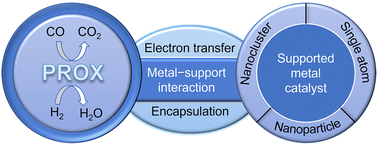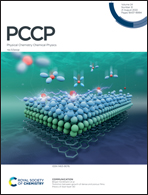Understanding and application of metal–support interactions in catalysts for CO-PROX
Abstract
Preferential oxidation of carbon monoxide (CO-PROX) plays a vital role in H2 purification in the upstream systems of proton exchange membrane fuel cells (PEMFCs) for its high efficiency, low cost and practicability. The key to the application of CO-PROX is the design and preparation of catalysts, and the supported metal catalysts have been the mainstay after decades of development. The metal–support interaction (MSI), which acts as a bridge between the design of supported catalysts and atomic-level theoretical research, has triggered increasing attention. There is a growing body of literature that recognizes the importance of the MSI in heterogeneous catalysis. In this review, the impacts of the MSI including strong metal–support interactions and electronic metal–support interactions on the essential characteristics of supported single atom, nanocluster and nanoparticle catalysts, and therefore, on catalytic behaviors were discussed, respectively, primarily focusing on electron transfer, chemical bonding and the encapsulation of active sites induced by the MSI. We also presented an overview of how the MSI can be utilized to rationally design catalysts to meet target requirements such as high activity, selectivity or stability via appropriate selection and modification of support and active species. The perspectives of the future development for comprehensive understanding of the MSI were also proposed.

- This article is part of the themed collection: PCCP Reviews


 Please wait while we load your content...
Please wait while we load your content...